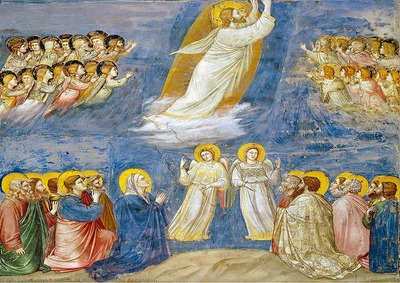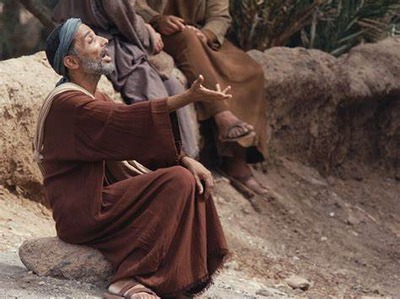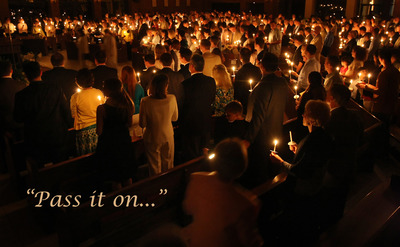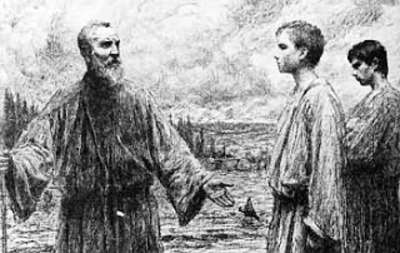June 1, 2025
|by N W
|
0 Comments
|
Deacon Mark, Easter, Evangelization, Joy, Mission, Sacraments
Solemnity of the Ascension of the Lord
June 1, 2025 — Year C
Readings: Acts 1:1-11 / Ps 47 / Eph 1:17-23 / Lk 24:46-53
by Rev. Mr. Mark De La Hunt, Permanent Deacon
Though it is the seventh Sunday of Easter, in our diocese, we are celebrating the Solemnity of the Ascension of the Lord today. It is the prequel to Pentecost, which is celebrated next Sunday, and that concludes the Easter season.
There are a couple of other things to note about next weekend. First, Holy Name of Mary seminarian, Deacon Sam Hill, will be ordained on Saturday and will celebrate his first Mass as a priest next Sunday at St. Andrews Basilica in Roanoke, and he invited me to serve on the altar with him. Second, Pentecost marks the end of year three of the Eucharistic Revival, the year of mission. The year of mission ties powerfully to the Ascension of our Lord, so that is the focus of this homily.
Before I preach on mission though, I want to share some teachings on the Ascension from some greats in the American Catholic Church. Scott Hahn, speaking about the Ascension on YouTube, says that, when Jesus ascended, He took our humanity into the divinity, thereby completing our redemption. Jesus’ Ascension unites us to the Trinity.
Bishop Fulton Sheen, also speaking about the Ascension on YouTube, explained that Jesus ascended to the right hand of God because He shares in God’s glory and is mediator between God and man. As mediator, Jesus is constantly showing His Father His wounds, saying, “Father, I love them.” Jesus can say this because He entered into all our brokenness and experienced all our temptations, and He sympathizes with us. We know this because, from the cross, Jesus said, “Father, forgive them, for they do not know what they do.” (Lk 23:34)
Now let’s discuss the relationship between the Ascension and mission. In his reflections on the rosary’s Glorious Mysteries on the Hallow app, Bishop Robert Barron speaks of the Ascension (the second Glorious Mystery of the rosary), listing four things related to mission:
1) Notice that Jesus ascends after commissioning the disciples to take the gospel to the whole world. (Acts 1:8; Lk 24:47-48)
2) Jesus ascends but does not leave us. By ascending, He is now with all of us all the time, for He is no longer bound by space and time.
3) Those who focus on heaven do the most good here on earth. Those who pray most intently are most effective in the practical realm.
4) Jesus’ Ascension is an invitation to us to go on mission. He exited the stage of God’s “theo-drama” so that we could enter the stage and continue Jesus’ mission under the direction of the Holy Spirit, who enters the theo-drama on Pentecost.
Reflecting on the third Glorious Mystery, Bishop Barron said the descent of the Holy Spirit enabled us to “go on mission.” He elaborated, saying that living in the Spirit removes fear and even brings joy in persecution. And Barron noted that the Holy Spirit appeared as tongues of fire. He likened this to those living in the Spirit having fiery speech that is public. We see this courageous missionary spirit in the early Church.
It has not been that way as much lately. I am not sure when Catholics, especially in Europe and North America, stopped thinking in missionary terms, but we did. In a survey of various Christian traditions, Catholics ranked well below other traditions in missionary focus or evangelization. In the United States, I would say we are in the early stages of reversing that. We are beginning to understand two things. One, to quote Bishop Barron, “Catholicism is smart…beautiful…colorful and textured. It engages the mind, body, and soul.” Second, is that if we care for others, we should want them to encounter the healing power of Christ in the Sacraments and in the Mass. We should want them to experience the divine life and joy we are experiencing and that Jesus’ Ascension made possible.
Speaking of joy, the joyful moment described in Psalm 47 today, “God mounts His throne to shouts of joy,” is a prophecy fulfilled (like the other three hundred prophecies Jesus fulfilled) in today’s gospel. St. Luke wrote, “As He blessed them, He parted from them and was taken up to heaven. They did him homage (worshipped Him) and then returned to Jerusalem with great joy.” That joy led them to “continually praising God in the temple.” (Lk 50-53)
Now let’s bring these reflections closer to our personal lives. About twenty years ago, I was a catechist teaching fifth-graders. One of them asked me, “Why should we want people to become Catholic, even other Christians?” I gave an answer, but it was not very good. It bothered me that I could not give a confident and clear answer. His question is so important, for in the answer is both our mission and our inspiration to evangelize.
To me, joy and love work hand in hand in being a missionary disciple who brings people to Jesus through the Catholic Church and brings fallen-away Catholics back to Jesus. The joy we have experienced we should want others to experience, especially if we love them. Jesus asked us to love others as He does. That means we should love everyone and want all to know the joy we know. Bishop Barron says, “The surest sign that God is alive in you is joy.” This is what Jesus meant when He said, “I came that they may have life, and have it to the full.” (Jn 10:10)
Through the Catholic Church, Jesus touches the mind, heart, and the body. This should give us confidence as evangelists and missionary disciples! Catholic Christians can literally bring people to Jesus. Our faith awakens all five human senses.
Chris Stefanick, on the topic of evangelization on Formed, got me thinking about the following:
Other churches can say, “Jesus forgives your sins,” but the person they are speaking to might wonder, “How will I know Jesus heard my prayer and how will I know for sure that He has forgiven me?” We Catholics can say, “Jesus forgives your sins through His priest, who will be sitting there with you. You will hear that priest, an emissary of Jesus, say, “I absolve you from all your sins.” You will feel unburdened and receive grace to strengthen you against temptation and to be more compassionate toward others who sin. And you can share your personal testimony, “I know this, because I have experienced Jesus’ power in Confession.”
Other churches can say, “You will be fed God’s word at our church.” We can say, “You will be fed by God’s word and Jesus Himself in the Catholic Church. Jesus said, “I am the living bread that came down from heaven. Whoever eats of this bread will live forever; and the bread that I will give for the life of the world is my flesh.” (Jn 6: 51). He does this through His priests, through the power of the Holy Spirit. During worship, you literally receive the bread Jesus spoke of and that the earliest Christians, such as St. Justin Martyr in 155 AD, wrote about! And you can share your personal testimony, “I know that bread is really His flesh, because I have experienced healing and peace after eating it.”
Do you see how compelling our Catholic faith is? It engages all the senses and the mind and literally feeds our soul. My answer to that fifth-grader’s question now is something like, “I want others to become Catholic, including other Christians, because I want them to encounter Jesus’ love and healing not just spiritually, but physically, for that is the ‘living life to the full’ Jesus said He desires for us. I want them to know my joy. I want them to have not just a personal relationship with Jesus, but a physically intimate one.”
How do we bring others into the Church? We emulate Jesus by going to those who are seeking something more and just cannot find it. Jesus reached out to the seekers of food, good health, and freedom, feeding the hungry, healing the sick, and freeing the sinner. They listened to Him, because He gave them a vision of a better life and showed them the way there and gave them the grace they needed to follow the way. People who are suffering are often ready for change and so respond to our invitation more readily.
Who in your life is seeking and ready for change? Show them the way to encounter the true God in the physical vehicles of grace we call Sacraments. The Sacraments are concrete things you can smell, touch, taste, and hear that put us in touch with the divine. Prayer, praise, and song are all amazing, but Jesus gave us even more. He did not leave us alone with hungers that cannot be filled. He feeds, heals, and forgives us through His holy priests. Not holy in and of themselves but made holy through the Holy Spirit in yet another Sacrament that is tangible, Holy Orders.
What an amazing gift we have received and that we can share with others. I am not preaching solely an intellectual argument here. I am preaching the person of Jesus who came to me physically in the Sacraments and saved me. My life was a mess when His grace broke upon me through another tangible Sacrament, marriage.
Now let’s pray for the grace to go on mission: Lord Jesus, keep us mindful that “we draw close to heaven and enter heaven to the extent we draw close to You and enter into communion with You.” (Magisterium AI, on the Hallow App) At the right hand of the Father, You continually offer Yourself for us, and You sent the Holy Spirit to your Church so that your heavenly offering may be made present in the Eucharist on this altar at every Mass. May the Holy Spirit give us the courage, joy, and love we need to bring others to encounter You in the Sacraments of your Church. Amen.
KEEP READING
 540-586-8988
540-586-8988 










